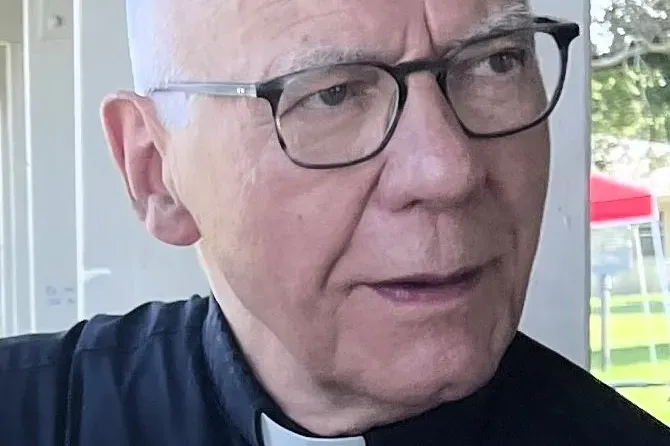“You can’t be a Christian and a Democrat.”
You might have heard that Republican charge if you’ve volunteered for a Democratic candidate in Kentucky — maybe even for union-endorsed Gov. Andy Beshear this time around. (He and First Lady Britainy Beshear are deacons at Beargrass Christian Church in Louisville.)
“Basically, I think what they are talking about is the right to life,” said Father Anthony Shonis, a retired Catholic priest who lives in Henderson. “But the church — and certainly Pope Francis — teaches that the right to life is more than unborn children.
“You can bring children into this world, but you really have to be able to take care of them, and that’s where the unions come into play by providing a family-sustaining wage.
Organized labor views Shonis as a longtime ally. A Pennsylvania native, he grew up in a union household.
Shonis received the Owensboro Council of Labor’s “J.R. Gray Union Person of the Year” award at the group’s annual Labor Day picnic. The inscription on the award plaque praised Shonis “For His Tireless Dedication Preserving & Promoting the Rights, Benefits, And Protection Of The Area Work Force.”
Gray, from Benton, was a longtime Democratic state representative, labor secretary, and Machinists union official. Unions consider Gray, who died at age 83 in 2022, one of organized labor’s best-ever friends in Frankfort.
Last year, the Supreme Court’s conservative majority overturned Roe v. Wade, the landmark 1973 ruling that legalized abortion. Supporters who cheered the ruling call themselves “pro-life.” The Catholic Church opposes abortion.
“It's easy to turn these complex issues into black and white, and people want to do that all the time,” Shonis said. “But the issue isn’t simply giving birth to a child. You have to raise a child and nurture a child, and that takes a family-sustainable wage — and I think that’s a strong suit of the Democratic Party.”
He suspects some Catholics are unaware of the church’s historic social teachings, which include support for the right of workers to organize and bargain collectively.
Rerum Novarum, Pope Leo XIII’s 1891 encyclical, put the church “on the side of the working people,” said Shonis. “Catholic social teaching emphasizes the dignity of workers.”
The Holy Father issued the encyclical at a time when increasing industrialization was widening the gap between rich and poor. It warned “... By degrees it has come to pass that working men have been surrendered, isolated and helpless, to the hardheartedness of employers and the greed of unchecked competition. The mischief has been increased by rapacious usury, which, although more than once condemned by the Church, is nevertheless, under a different guise, but with like injustice, still practiced by covetous and grasping men. To this must be added that the hiring of labor and the conduct of trade are concentrated in the hands of comparatively few; so that a small number of very rich men have been able to lay upon the teeming masses of the laboring poor a yoke little better than that of slavery itself.”
The encyclical also said that organizing a union “is the natural right of man; and the State has for its office to protect natural rights, not to destroy them; and, if it forbid its citizens to form associations, it contradicts the very principle of its own existence, for both they and it exist in virtue of the like principle, namely, the natural tendency of man to dwell in society.”
Many other Catholic Church statements echo Rerum Novarum, including:
The Church fully supports the right of workers to form unions or other associations to secure their rights to fair wages and working conditions. This is a specific application of the more general right to associate. In the words of Pope John Paul II, “The experience of history teaches that organizations of this type are an indispensable element of social life, especially in modern industrial societies.”
– Economic Justice for All #104
Pastoral Letter on Catholic Social Teaching and the U.S. Economy
U. S. Catholic Bishops, 1986
The capital at the disposal of management is in part the product of the labor of those who have toiled in the company over the years, including currently employed workers. As a minimum, workers have a right to be informed in advance when such decisions are under consideration, a right to negotiate with management about possible alternatives, and a right to fair compensation and assistance with retraining and relocation expenses should these be necessary. Since even these minimal rights are jeopardized without collective negotiation, industrial cooperation requires a strong role for labor unions in our changing economy.
– Economic Justice for All #303
Pastoral Letter on Catholic Social Teaching and the U.S. Economy
U. S. Catholic Bishops, 1986
But above all we must remember the priority of labor over capital: labor is the cause of production; capital, or the means of production, is its mere instrument or tool.
– Laborem Exercens (On Human Work) #12 John Paul II, 1981
Yet the workers’ rights cannot be doomed to be the mere result of economic systems aimed at maximum profits. The thing that must shape the whole economy is respect for the workers’ rights within each country and all through the world’s economy.
– Laborem Exercens (On Human Work) #17 John Paul II, 1981
Shonis, who has delivered the invocation at the Kentucky State AFL-CIO Convention, delivered the prayer opening the Owensboro picnic. He noted that our democracy “was purchased for us by the struggles of working men and women.” He added, “And we pray for a full economic democracy, where working men and women will participate in the decisions that affect their lives and families ... a family sustainable wage, safety on the job, health insurance, and pension benefits.
“We remember all workers this Labor Day: blue-collar, white-collar, union, non-union, employed and unemployed, but especially, we remember the men and women who serve in our armed forces ... for they too are workers.
“May all our union brothers and sisters and all workers who have died on the job rest in peace.”
--30--
Cross-posted from the KY AFL-CIO web site.
Comments








